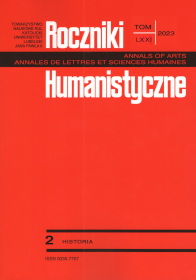Seminarium Rzeczypospolitej czy jaskinia zbójców? Wokół debaty o pożytkach edukacji uniwersyteckiej w Polsce XVI wieku
A Commonwealth Seminar or a Den of Robbers? On the Debate on the Benefits of a University Education in Poland in the 16th Century
Author(s): Maciej ZdanekSubject(s): History, Modern Age, 16th Century
Published by: Towarzystwo Naukowe KUL & Katolicki Uniwersytet Lubelski Jana Pawła II
Keywords: University of Kraków; 16th century; education; Executionist movement; nobility; idea of “seminarium Reipublicae”
Summary/Abstract: The University of Kraków in the 16th century, like other European universities established in the Middle Ages, was going through a difficult time. The emergence of a new network of secondary schools and universities, humanist culture, new models of education, criticism of the scholastic curriculum, and the Reformation brought numerous challenges and difficulties. The number of students and promotions, income level and social prestige declined. In Poland, from the mid-16th century, the University of Kraków was subject to increasing criticism. The Executionists at the Sejm formulated the opinion that the university was in a state of decline, had become a ‘den of robbers’ and was failing to fulfil its educational and pedagogic tasks, especially towards the nobility. This article analyses the idea of the university as a ‘seminarium Reipublicae’, the participation of the masters in the debate about the shape of public education, and especially their attempts to influence the nobility based on selected university texts. The statistical data show that, despite its weakened status, the university fulfilled the task of educating the social elite and retained its position on the educational map of Renaissance Poland.
Journal: Roczniki Humanistyczne
- Issue Year: 71/2023
- Issue No: 2
- Page Range: 131-150
- Page Count: 20
- Language: Polish

